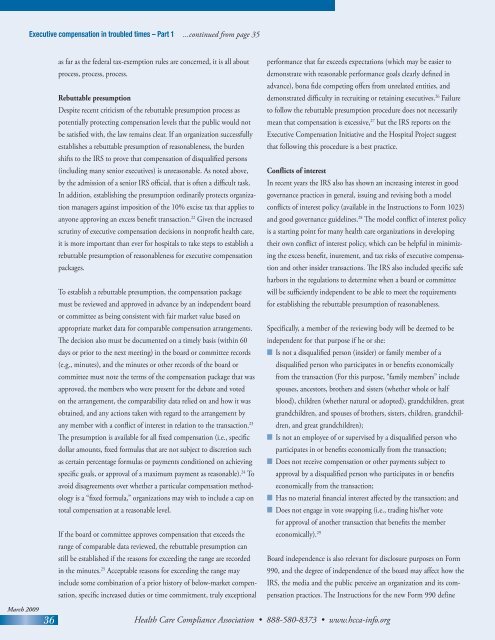BP - Health Care Compliance Association
BP - Health Care Compliance Association
BP - Health Care Compliance Association
Create successful ePaper yourself
Turn your PDF publications into a flip-book with our unique Google optimized e-Paper software.
Executive compensation in troubled times – Part 1 ...continued from page 35<br />
as far as the federal tax-exemption rules are concerned, it is all about<br />
process, process, process.<br />
Rebuttable presumption<br />
Despite recent criticism of the rebuttable presumption process as<br />
potentially protecting compensation levels that the public would not<br />
be satisfied with, the law remains clear. If an organization successfully<br />
establishes a rebuttable presumption of reasonableness, the burden<br />
shifts to the IRS to prove that compensation of disqualified persons<br />
(including many senior executives) is unreasonable. As noted above,<br />
by the admission of a senior IRS official, that is often a difficult task.<br />
In addition, establishing the presumption ordinarily protects organization<br />
managers against imposition of the 10% excise tax that applies to<br />
anyone approving an excess benefit transaction. 22 Given the increased<br />
scrutiny of executive compensation decisions in nonprofit health care,<br />
it is more important than ever for hospitals to take steps to establish a<br />
rebuttable presumption of reasonableness for executive compensation<br />
packages.<br />
To establish a rebuttable presumption, the compensation package<br />
must be reviewed and approved in advance by an independent board<br />
or committee as being consistent with fair market value based on<br />
appropriate market data for comparable compensation arrangements.<br />
The decision also must be documented on a timely basis (within 60<br />
days or prior to the next meeting) in the board or committee records<br />
(e.g., minutes), and the minutes or other records of the board or<br />
committee must note the terms of the compensation package that was<br />
approved, the members who were present for the debate and voted<br />
on the arrangement, the comparability data relied on and how it was<br />
obtained, and any actions taken with regard to the arrangement by<br />
any member with a conflict of interest in relation to the transaction. 23<br />
The presumption is available for all fixed compensation (i.e., specific<br />
dollar amounts, fixed formulas that are not subject to discretion such<br />
as certain percentage formulas or payments conditioned on achieving<br />
specific goals, or approval of a maximum payment as reasonable). 24 To<br />
avoid disagreements over whether a particular compensation methodology<br />
is a “fixed formula,” organizations may wish to include a cap on<br />
total compensation at a reasonable level.<br />
If the board or committee approves compensation that exceeds the<br />
range of comparable data reviewed, the rebuttable presumption can<br />
still be established if the reasons for exceeding the range are recorded<br />
in the minutes. 25 Acceptable reasons for exceeding the range may<br />
include some combination of a prior history of below-market compensation,<br />
specific increased duties or time commitment, truly exceptional<br />
performance that far exceeds expectations (which may be easier to<br />
demonstrate with reasonable performance goals clearly defined in<br />
advance), bona fide competing offers from unrelated entities, and<br />
demonstrated difficulty in recruiting or retaining executives. 26 Failure<br />
to follow the rebuttable presumption procedure does not necessarily<br />
mean that compensation is excessive, 27 but the IRS reports on the<br />
Executive Compensation Initiative and the Hospital Project suggest<br />
that following this procedure is a best practice.<br />
Conflicts of interest<br />
In recent years the IRS also has shown an increasing interest in good<br />
governance practices in general, issuing and revising both a model<br />
conflicts of interest policy (available in the Instructions to Form 1023)<br />
and good governance guidelines. 28 The model conflict of interest policy<br />
is a starting point for many health care organizations in developing<br />
their own conflict of interest policy, which can be helpful in minimizing<br />
the excess benefit, inurement, and tax risks of executive compensation<br />
and other insider transactions. The IRS also included specific safe<br />
harbors in the regulations to determine when a board or committee<br />
will be sufficiently independent to be able to meet the requirements<br />
for establishing the rebuttable presumption of reasonableness.<br />
Specifically, a member of the reviewing body will be deemed to be<br />
independent for that purpose if he or she:<br />
n Is not a disqualified person (insider) or family member of a<br />
disqualified person who participates in or benefits economically<br />
from the transaction (For this purpose, “family members” include<br />
spouses, ancestors, brothers and sisters (whether whole or half<br />
blood), children (whether natural or adopted), grandchildren, great<br />
grandchildren, and spouses of brothers, sisters, children, grandchildren,<br />
and great grandchildren);<br />
n Is not an employee of or supervised by a disqualified person who<br />
participates in or benefits economically from the transaction;<br />
n Does not receive compensation or other payments subject to<br />
approval by a disqualified person who participates in or benefits<br />
economically from the transaction;<br />
n Has no material financial interest affected by the transaction; and<br />
n Does not engage in vote swapping (i.e., trading his/her vote<br />
for approval of another transaction that benefits the member<br />
economically). 29<br />
Board independence is also relevant for disclosure purposes on Form<br />
990, and the degree of independence of the board may affect how the<br />
IRS, the media and the public perceive an organization and its compensation<br />
practices. The Instructions for the new Form 990 define<br />
March 2009<br />
36<br />
<strong>Health</strong> <strong>Care</strong> <strong>Compliance</strong> <strong>Association</strong> • 888-580-8373 • www.hcca-info.org

















